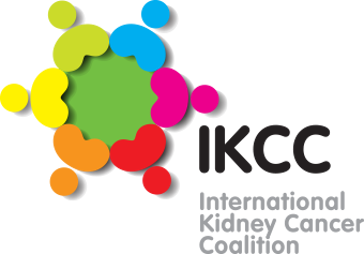Show your kidneys some love
The International Kidney Cancer Coalition (IKCC) conducts Global Patient and Carer Surveys to inform our advocacy efforts to reduce the global burden of kidney cancer. Our 2025 survey highlighted a key issue: many patients and carers are not sure of the best way to keep their kidneys healthy.
Not only is this important for patients’ physical and mental wellbeing, poor kidney function also affects quality of life, limits treatment choices and excludes patients from some clinical trials.
So, for World Kidney Cancer Day 2025, we have created a simple guide showing the three kidney tests everyone living with kidney cancer should do regularly, together with lifestyle tips and other advice for maintaining kidney health.
On World Kidney Cancer Day itself, we’re holding a Global Patient & Carer Symposium, where a panel of experts and patients will discuss all aspects of keeping your kidneys healthy when living with kidney cancer. Register now to attend or to receive a recording of the event afterwards.
Show your
kidneys some love
Global Patient & Carer Symposium
2.00pm–3.00pm CEST, Thursday 19 June 2025
to attend live or to receive a recording
There are three simple kidney tests your doctor can do
1. Monitor blood pressure
Low kidney function raises blood pressure; high blood pressure puts stress on your kidneys. Your doctor can give you medication to control your blood pressure.
2. Check your urine
Too much protein in your urine (proteinuria) can be a sign of reduced kidney function. Your doctor can also test your UACR (Urine Albumin:Creatinine Ratio).
3. Do a blood test
Your doctor can check for creatinine and eGFR (estimated Glomerular Filtration Rate), both signs of how effectively your kidneys are filtering your blood.
Diabetes?
Make sure your doctor is aware of your diabetes and whether it’s Type 1 or Type 2. If you use insulin, be sure to regularly monitor your blood glucose and A1C levels. Ask your doctor if you would benefit from a continuous glucose monitor.
Other medications or supplements?
Tell your doctor everything you are taking – even everyday medications like aspirin and ibuprofen. Many herbal supplements are also harmful to kidneys. It helps to take the packs along with you (or photos of them), so you don’t forget anything.
Immuno-compromised?
Be sure to let your doctor know if your immune system is not working as well as it should. A compromised immune system makes it harder for your body to fight off illnesses.
What else can I do to maintain kidney health?
There are also lifestyle changes that can make a big difference to kidney health. Here are four of them.
Talk to your doctor about which are the most important for you.
Quit smoking
Smoking is harmful to your kidneys, may increase the side effects and decrease the effectiveness of cancer treatments. It is also a major risk factor for many cancers, high blood pressure and heart disease.
Maintain a healthy weight
This reduces your risk of cancers and heart disease. If you need to lose weight – or gain weight, as people with kidney cancer often do – your doctor may be able to help.
Be active but avoid contact sports
Being active is beneficial for both physical and mental health. But contact sports – like football or most martial arts – put your kidneys at risk.
Drink enough water and no alcohol
It is important to stay hydrated. Drink sufficient water to satisfy normal thirst. When thirsty, choose water. The World Health Organisation (WHO) recommends no alcohol at all.
Useful links
International Kidney Cancer Coalition
A go-to resource for all things kidney cancer.
World Kidney Day
A global day focused on kidney health that happened 15 March 2025
National Kidney Foundation
The American Foundation on kidney disease
European Kidney Health Alliance
The European Kidney Health Alliance
European Kidney Patients’ Federation
The European Kidney Patients’ Federation







